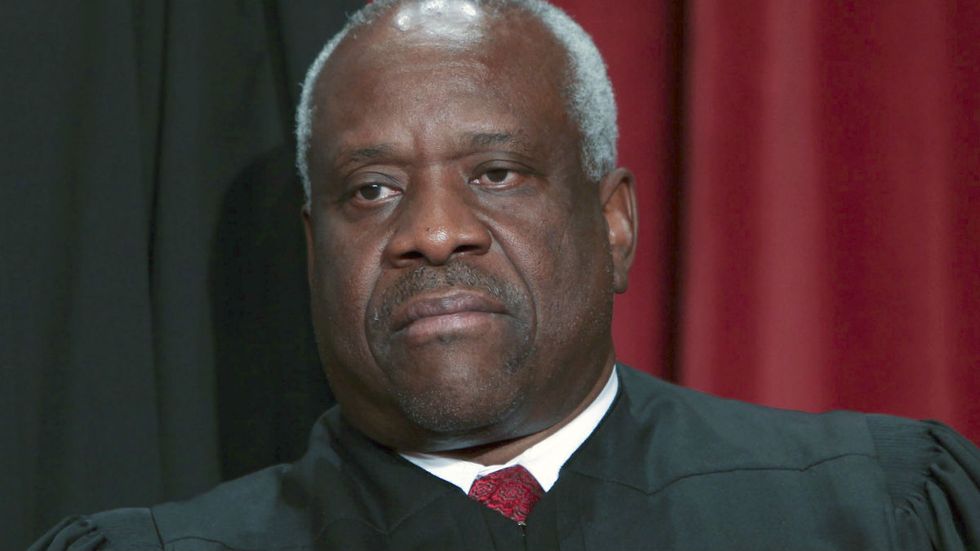
© 2024 Blaze Media LLC. All rights reserved.
Justice Thomas is right: SCOTUS makes mistakes — and those mistakes shouldn't last forever
June 18, 2019
The Supreme Court ought to be better able to correct its past legal mistakes without needing an extraordinary reason to do so.
That was the major point of a concurring opinion from Justice Clarence Thomas on Monday that confronted SCOTUS' stare decisis practice head-on.
As a 2018 Congressional Research Service report explains, stare decisis is Latin for “to stand by things decided" and means that a court "will follow its prior decisions absent exceptional circumstances (e.g., the Supreme Court following its decisions unless they have become too difficult for lower courts to apply)."
As Justice Robert Jackson explained the concept in his concurring opinion in the 1952 Brown v. Allen case, "We are not final because we are infallible, but we are infallible only because we are final."
Thomas said that he wants the court to revisit how it handles past precedent.
"In my view, the Court’s typical formulation of the stare decisis standard does not comport with our judicial duty under Article III [of the Constitution] because it elevates demonstrably erroneous decisions—meaning decisions outside the realm of permissible interpretation—over the text of the Constitution and other duly enacted federal law," Thomas wrote. "It is always 'tempting for judges to confuse our own preferences with the requirements of the law,' and the Court’s stare decisis doctrine exacerbates that temptation by giving the [veneer] of respectability to our continued application of demonstrably incorrect precedents."
Thomas also says that "by applying demonstrably erroneous precedent instead of the relevant law’s text ... the Court exercises 'force' and 'will,' two attributes the People did not give it."
And that makes a lot of sense. After all, if the reasoning of one imperfect human being can be wrong, then so can the reasoning of nine imperfect human beings on a judicial panel.
Indeed, seeing as there's absolutely nothing about a Senate confirmation that grants anybody infallibility, even accomplished attorneys and judges who have reached the pinnacle of their profession make mistakes. And those mistakes can have awful consequences. Anyone who paid attention in high school history will remember the court's decisions in the Dred Scott, Plessy and Korematsu cases.
Dred Scott v. Sandford upheld the treatment of human beings as property and was never overturned by the court, but rather by the 14th Amendment. Plessy v. Ferguson created the “separate but equal” doctrine for segregation and was later overturned by Brown v. Board of Education. Korematsu v. United States — which upheld the forced internment of Japanese Americans during World War II — remained on the books for decades because there was no applicable vehicle to overturn it until last summer, when the Supreme Court finally did.
But when it comes to current precedent, as Thomas explains "The true irony of our modern stare decisis doctrine lies in the fact that proponents of stare decisis tend to invoke it most fervently when the precedent at issue is least defensible."
And that brings us to the question of Roe v. Wade. Where pro-lifers see a poorly decided ruling that they want re-evaluated, abortion defenders can't seem to stop clamoring about the importance of precedent when it comes to the 1973 decision. But you'd be hard-pressed to find a leftist whose opinions on SCOTUS precedent are the same for Roe v. Wade as they are for the court's decision in Citizens United.
But one has to wonder what's actually scarier for the pro-abortion movement if pro-life laws could be considered without Roe v. Wade as a shield: Losing court-mandated access to procedures that kill unborn children, or ending up in the dustbin of legal history alongside past proponents of slavery and segregation?
#mc_embed_signup{background:#fff; clear:left; font:14px}
/* Add your own MailChimp form style overrides in your site stylesheet or in this style block.
We recommend moving this block and the preceding CSS link to the HEAD of your HTML file. */
Want to leave a tip?
We answer to you. Help keep our content free of advertisers and big tech censorship by leaving a tip today.
Want to join the conversation?
Already a subscriber?
Nate Madden
Nate is a former Congressional Correspondent at Blaze Media. Follow him on Twitter @NateOnTheHill.
more stories
Sign up for the Blaze newsletter
By signing up, you agree to our Privacy Policy and Terms of Use, and agree to receive content that may sometimes include advertisements. You may opt out at any time.
© 2024 Blaze Media LLC. All rights reserved.
Get the stories that matter most delivered directly to your inbox.
By signing up, you agree to our Privacy Policy and Terms of Use, and agree to receive content that may sometimes include advertisements. You may opt out at any time.



